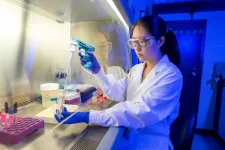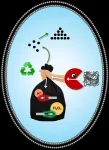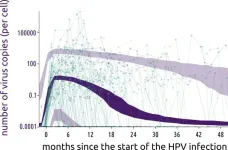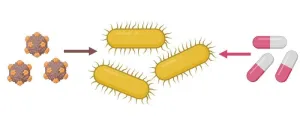(Press-News.org) Researchers at the University of Florida College of Veterinary Medicine and the UF Health Cancer Center have identified a crucial link between a gene mutation and immune system signaling in canine hemangiosarcoma, a discovery that could lead to better treatments for both dogs and humans with similar cancers.
The research focuses on hemangiosarcoma, an aggressive cancer that forms malignant blood vessels in dogs. This life-threatening condition is difficult to diagnose early, as tumors can grow silently before rupturing without warning, leading to emergencies. The prognosis is poor, with only 10% of diagnosed dogs surviving beyond one year, and none living past two years.
While hemangiosarcoma can affect any breed at any age, older golden retrievers are especially susceptible. The cancer’s high incidence in dogs — estimated at more than 50,000 cases annually in veterinary clinics — provides researchers with valuable data that could benefit human patients with angiosarcoma, a rare but similar cancer that affects about 1,000 Americans each year.
“The best four-legged friends of humans help us do high-quality cancer research,” said Jon Kim, D.V.M., Ph.D., an assistant professor at the college and the study’s lead researcher. “We learn a lot about human cancer biology from studying cancer in dogs.”
The research team’s findings, detailed last year in two pioneering publications, most recently Cancer Gene Therapy, reveal an important discovery about how this cancer grows and spreads. The team found that hemangiosarcoma doesn’t just create its own blood vessels — it hijacks healthy cells nearby, forcing them to help build the blood vessels that feed the tumor.
Even more significantly, the researchers discovered that a specific genetic mutation in the PIK3CA gene causes cancer cells to send out signals that confuse the body’s immune system.
While scientists have known about PIK3CA mutations in human cancers for years, they haven’t fully understood how these mutations affect the way cancer grows and responds to treatment. The study findings help fill in these knowledge gaps, Kim said.
“This new research provides us with critical insights that could lead to novel therapies for both canine hemangiosarcoma patients with this mutation and human patients with angiosarcoma,” he said.
The rarity of human angiosarcoma has hampered research efforts, making it difficult to gather enough data for meaningful clinical trials and to understand the cancer’s fundamental biology. However, the much higher incidence of hemangiosarcoma in dogs offers researchers a robust natural model for study, the researchers said.
“We see a lot of dogs with hemangiosarcoma in veterinary clinics,” Kim said. “We hope our work will be beneficial, not only for sick dogs, but also for human patients with this terrible disease.”
In laboratory experiments, the research team discovered that hemangiosarcoma cells have a unique ability to stimulate blood cell production. This process could influence the generation of ‘cancer-friendly’ immune cells, effectively confusing the body's immune system and enabling cancer growth. The team's recent work shows this process can be driven by the mutant PIK3CA gene, suggesting new therapeutic possibilities targeting this mutation and its effects on immune disruption.
“Our hope is that this innovative approach will help us better understand the clinical and translational significance of our findings from dogs for rare human cancers,” Kim said.
END
Study of deadly dog cancer reveals new clues for improved treatment
2025-01-21
ELSE PRESS RELEASES FROM THIS DATE:
Skin-penetrating nematodes have a love-hate relationship with carbon dioxide
2025-01-21
Key takeaways
Globally, over 600 million people are infected with the skin-penetrating threadworm, Strongyloides stercoralis, mostly in tropical and subtropical regions with poor sanitation infrastructure.
Infections are treated with ivermectin, but some nematodes are starting to develop resistance to this first-line drug.
UCLA biologists have discovered that the nematodes respond differently to carbon dioxide at different stages in their life cycle, which could help scientists find ways to prevent or cure infections by targeting ...
Fewer than 1% of U.S. clinical drug trials enroll pregnant participants, study finds
2025-01-21
PROVIDENCE, R.I. [Brown University] — A new study by researchers from the Brown University School of Public Health found that pregnant women are regularly excluded from clinical drug trials that test for safety, raising concerns for the efficacy of these medications for maternal and child health.
The study, published in the American Journal of Obstetrics and Gynecology, analyzed 90,860 drug trials involving women ages 18 to 45 from the past 15 years and found that only 0.8% included pregnant participants. ...
A global majority trusts scientists, wants them to have greater role in policymaking, study finds
2025-01-21
In what is considered the most comprehensive post-pandemic survey of trust in scientists, researchers have found a majority of people around the world carry widespread trust in scientists — believing them to be honest, competent, qualified and concerned with public well-being.
Researchers surveyed more than 72,000 individuals across 68 countries on perceptions of scientists’ trustworthiness, competence, openness and research priorities.
The results, published in the journal Nature Human Behavior, also showed the general public’s desire ...
Transforming China’s food system: Healthy diets lead the way
2025-01-21
According to the study published in Nature Food, China’s current trajectory is misaligned with the United Nations Sustainable Development Goals (SDGs). The researchers assessed potential pathways for achieving the SDGs in China by transforming its food system, focusing on dietary changes, climate change mitigation, ecological conservation, and socio-economic development. “Action across all areas of the food system is required to achieve a sustainable food system and efficiently address the wide range of social and environmental ...
Time to boost cancer vaccine work, declare UK researchers
2025-01-21
UK oncology researchers have come together to write the first ever national thought leadership strategy report into cancer vaccine advances and the opportunities these present for those affected by cancer. The strategy report has been published in Cambridge University Press journal Cambridge Prisms: Precision Medicine.
Cancer vaccines hold the potential to revolutionise cancer treatment. These vaccines leverage neoantigens to activate the immune system against tumours, offering a personalised approach to combat cancer. This transformative potential is particularly significant in light of recent advancements in oncology, including ...
Colorado State receives $326M from DOE/EPA to improve oil and gas operations and reduce methane emissions
2025-01-21
The Department of Energy and Environmental Protection Agency have awarded $326 million to three Colorado State University research projects that aim to improve U.S. oil and gas operations and reduce methane emissions nationwide.
The EPA’s Methane Emissions Reduction Program is providing the funding to the CSU Energy Institute and faculty working across multiple departments in the Walter Scott, Jr. College of Engineering, with the goal of helping oil and gas operators improve operational efficiency and manage emissions. The efforts will also support activity to build an inventory of methane emissions, ...
Research assesses how infertility treatments can affect family and work relationships
2025-01-21
Infertility is a problem that affects between 8% and 12% of couples of reproductive age worldwide – for some of them, the problem interrupts a life project, which is the desire to have children and build a family. Advances in technology and medicine have made assisted reproductive treatments possible, but they can be physically and psychologically draining for the couples involved, especially because of expectations of results that may not be achieved.
The emotional impact of treatment is well documented in the scientific literature. ...
New findings shed light on cell health: Key insights into the recycling process inside cells
2025-01-21
A recent study from Tata Institute of Fundamental Research, Mumbai, India has revealed new details about how our cells clean up and recycle waste. This process, known as autophagy, is like a self-cleaning mechanism for cells, helping the cells stay healthy by getting rid of damaged parts and recycling useful components. The process involves formation of a vesicle called autophagosome, which encapsulates the cellular waste. The autophagosome then fuses with another type of vesicle called lysosome. ...
Human papillomavirus infection kinetics revealed in new longitudinal study
2025-01-21
Non-persistent human papillomavirus (HPV) infections are characterized by a sharp increase in viral load followed by a long plateau, according to a study published January 21st in the open-access journal PLOS Biology by Samuel Alizon of the National Centre for Scientific Research (CNRS), France, and colleagues.
Chronic HPV infection is responsible for more than 600,000 new cancers each year, including nearly all cervical cancers. Infection among young women is common, impacting nearly 20% of women 25 years of age. Fortunately, the vast majority of these infections ...
Antibiotics modulate E. coli’s resistance to phages
2025-01-21
In your coverage, please use this URL to provide access to the freely available paper in PLOS Biology: http://journals.plos.org/plosbiology/article?id=10.1371/journal.pbio.3002952
Article title: Chloramphenicol and gentamicin reduce the evolution of resistance to phage ΦX174 by suppressing a subset of E. coli LPS mutants
Author countries: Germany
Funding: This work was generously supported by funds from the Max Planck Society (L.P.-F.B.). L.P. was supported by the International Max Planck Research ...




